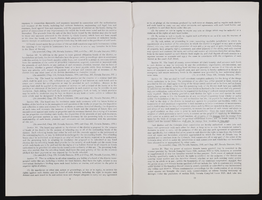Search the Special Collections and Archives Portal
Search Results
Bob Fisher oral history interview
Identifier
Abstract
Oral history interview with Robert Fisher conducted by Barbara Tabach on January 08, 2015 for the Southern Nevada Jewish Heritage Project. In this interview, Fisher discusses his childhood in Minnesota, and the large role Judaism played in his upbringing. He speaks at length about his involvement with United Synagogue of Conservative Judaism over the years, including as regional director of the United Synagogue Youth Far West Region, which took him from Minnesota to California. He talks about his time in Los Angeles, California, and later, about his life in Las Vegas, Nevada, including his broadcasting career as well as involvement with Midbar Kodesh Temple.
Archival Collection
Gloria Freeman Dell oral history interview
Identifier
Abstract
Oral history interview with Gloria Freeman Dell conducted by Claytee D. White on April 05, 2011 for the Boyer Early Las Vegas Oral History Project. In this interview, Dell discusses her life as a Las Vegas, Nevada showgirl and her experiences in the entertainment industry. She describes working at the Flamingo Hotel and tells several anecdotes about prominent entertainers she met or performed with, including Dean Martin, Frank Sinatra, and Ella Fitzgerald. Dell also discusses living in a barracks specifically for showgirls, being pursued romantically by Howard Hughes, and concludes the interview by singing a song from one of her former acts.
Archival Collection
Harriet Barlow oral history interview
Identifier
Abstract
Oral history interview with Harriet Barlow conducted by Elsha Harris-Tolanda on April 27, 2015 for the African Americans in Las Vegas: a Collaborative Oral History Project. In this interview, Barlow discusses her personal history and growing up in Robbins, Illinois. She talks about her education, discrimination in schools, and the process of school integration. Barlow then recalls her first impressions of Las Vegas, Nevada and her employment at the University of Nevada, Las Vegas. Lastly, Barlow describes going through graduate school as an African American and explains why conversations about race relations can be difficult.
Archival Collection
Charles Roland oral history interview
Identifier
Abstract
Oral history interview with Charles Roland conducted by Claytee D. White on August 16, 2012 for the African Americans in Las Vegas: a Collaborative Oral History Project. Roland begins by describing why his family moved to Las Vegas, Nevada in 1952 and attending Las Vegas High School. He discusses the African American community in Las Vegas, working in a restaurant called Sill's Drive-In, and his father, who opened the Hamburger Heaven restaurants. Roland also discusses race relations in Las Vegas prior to integration, the Binion family, and how Las Vegas has changed.
Archival Collection
Helen Smith oral history interview
Identifier
Abstract
Oral history interview with Helen Smith conducted by Claytee D. White on February 20, 2007 for the Boyer Early Las Vegas Oral History Project. In this interview, Smith discusses her personal history and moving to Las Vegas, Nevada in 1956. She then talks about her employment at Southern Nevada Memorial Hospital and the change to University Medical Center (UMC). Smith recalls an air conditioning business she co-owned with her husband at the time, and the activities she did as a member of Daughters of the Nile, a women's community service organization. Lastly, she discusses education and the general changes in Las Vegas.
Archival Collection
John W. Crabbe oral history interview
Identifier
Abstract
Oral history interview with John W. Crabbe conducted by Patricia van Betten on January 19, 2004 for the Blue Diamond Oral History Project. In the interview, Crabbe discusses moving to Blue Diamond Village in southern Nevada as a child in the 1950s. Crabbe talks about attending Rancho High School in Las Vegas, Nevada and the long bus commute he took daily to school. Crabbe then recalls his experiences horseback riding in Bonnie Springs, Nevada and his employment at Howard Hughes' airline, Hughes Air West. Lastly, Crabbe discusses the civic activities available growing up in the Blue Diamond Village.
Archival Collection
Susan and Holly Carratelli oral history interviews
Identifier
Abstract
Oral history interviews with Susan and Holly Carratelli conducted by Dennis McBride on June 24 and 26, 1999 for the Las Vegas Gay Archives Oral History Project. In the interviews, Susan and Holly recall first meeting during the planning for the 1994 National Coming Out Day event in Las Vegas, Nevada. They discuss what they value in a relationship, their past relationship experiences, and their involvement with the Gay and Lesbian Community Center and Metropolitan Community Church. Other subjects they cover include their marriage, anecdotes about living together, having children, their daily routine, and conflicting inter-community perceptions between gay men and women in Las Vegas.
Archival Collection
Series I. The Caddo Company, Incorporated, 1922 to 1965
Level of Description
Scope and Contents
The Caddo Company, Incorporated series (1922-1965) is comprised of twelve sub-series containing film production and corporate records.
The first two sub-series contain materials related to two films that predate the formation of The Caddo Company, Incorporated as a production company,
Materials within each film sub-series include advertising and publicity, administrative, censorship, distribution, editing, financial, legal, and production and direction records, as well as film soundtracks and screenplays. Types of materials include of ledgers, correspondence, storyboard images, sheet music, and original scores, as well as film, direction, set, and production stills. Corporate records consist of newspaper clippings, administrative correspondence, actor and distribution contracts, and financial reports.
Archival Collection
Collection Name: Howard Hughes Film Production Records
Box/Folder: N/A
Archival Component


